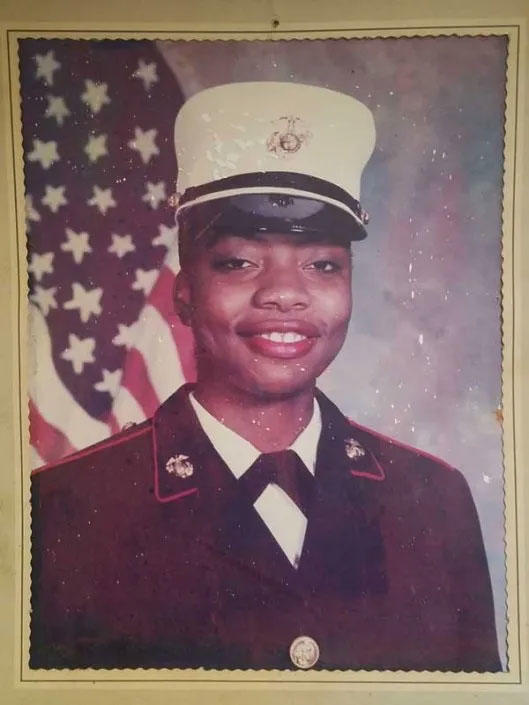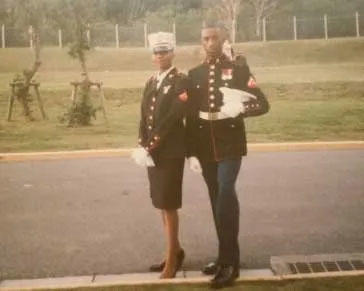This article first appeared on The War Horse, an award-winning nonprofit news organization educating the public on military service. Subscribe to their newsletter.
I was barely off the plane when the tropical air hit me—salty Pacific raindrops stinging my face, sweet-spicy Japanese aromas teasing my nose. Eighteen, fresh from Marine Corps boot camp, 7,500 miles from home, 13 hours in the air, halfway across the world.
I wrestled with my seabag, smoothed my hair into a tight, sleek bun, and patted the dampness from my pressed jungle cammies as I walked past a gunny at the gate and handed my orders to a young corporal at 3rd Medical Battalion, 3rd FSSG, Okinawa, Japan.
I was the new “WM”—Woman Marine—on deck, and I felt the weight of all eyes watching me for every right or wrong move I made. Women were less than 5% of the Marine Corps back in 1995—a tiny speck in a male-dominated world.
At boot camp in Parris Island, they’d smeared makeup on our faces, assembly line style, for graduation photos, then wiped it off fast. The world needed the image that we were still women, even if the Marine Corps didn’t prize our femininity. Within the ranks, we were viewed “not available for combat, but available for the service members,” hinting at a disgusting view of servicewomen.
Love? That was another thing we were expected to bury.

I learned the ropes quickly, settling into my role as personnel administration clerk for new arrivals at Camp Hansen’s admin shop. But the Corps hadn’t trained me for what to do when a tall Navy sailor walked in and my heart skipped a beat.
“Welcome to Camp Hansen,” I managed, standing to shake his hand, my heart doing cartwheels under my crisp uniform blouse. Our touch was professional, but a spark flared—we both felt it and looked away fast.
I held my bearing, glancing at him after every third clack on the old-school typewriter. The naval chief petty officer who ran the mixed Navy-Marine administrative shop eyed the sailor over his coffee mug while ordering me to get papers in order.
“Aye, sir,” I said, reorienting, shuffling papers and smoothing my bun—no time for lipstick. The sailor dropped his dirty seabag and sat as I took his orders.
“Where’s that accent from?” the sailor asked, grinning at my Southern drawl. “Memphis,” I smiled. “Ever been?”
“Sullivan, the Guam papers?” the Naval chief petty officer’s voice sharpened, cutting through.
The sailor’s visits to my admin shop stretched. Whenever he walked in, I would imagine that my combat boots were heels and that my uniform was a flowing dress. Our talks pivoted from administrative needs to quoting Chris Tucker scenes from Friday. He’d drop 2Pac lyrics from the new All Eyez on Me album, me joining word for word. I forgot Okinawa and the uniform and I started to feel at home—like a real woman, not a WM stamped in cammies.
Barely above a whisper, he planned a weekend escape for us to Kadena—the large Air Force base south of ours with movie theaters, a large arcade, and American dining. Marines and sailors were sparse there, making it easier to blend with colorful baggy sweatsuits, civilian military family members, and off-duty servicewomen who wore their hair down.
My office buzzed with co-workers clearing their throats and squinting the closer the sailor got to my desk. “Sullivan’s got a shadow,” they’d jab when he’d leave. “Just doing my job,” I replied, hiding my blushing face.
He was E-4 and I was E-3, a petty officer outranking a lance corporal, forbidden by regulations that policed romance across our chains of command— fraternization. That one small notch apart could tank our careers. I’d seen it happen—Marines busted down for less. Why’d I let him in? His laugh cut through the cammies, and I could be a woman. ...
We had been alone in the office one day, scheming another Kadena weekend, when I heard boots stomp across the freshly waxed floor.

“Sh*t!” I whispered. “Attention on deck,” I barked, snapping us both to our feet—my chair nearly tipped as I jumped.
The sailor stood ramrod straight beside my desk, but I felt him sneaking glances.
“Carry on,” the first sergeant said, eyeing us both, his stare a blade.
“Carry on, aye, sir,” the sailor replied, but his eyes locked on mine—breaking every unwritten rule of military courtesy.
The first sergeant did a double-take, so I shuffled papers, pretending to review personnel documents, sweaty hands shaking. Trying to make corporal next year, I couldn’t cross that line—not with all eyes waiting for me to crack. His glance was a dare I shouldn’t take but couldn’t shake.
Each day after that, every clack of my typewriter carried our secret—E-4 versus E-3, Navy versus Corps, pulling us both deeper into danger. It could cost our careers, and for me, stain my WM reputation.
Days later, a Black WM sergeant major caught me primping—Liz Taylor White Diamonds perfume on my wrists and gloss over my lipstick before he was due. Her boots gleamed sharper than any man’s, her tough exterior a wall—another Black woman who’d climbed the ranks.
“Lipstick’s loud, Marine,” she said, sizing me up with a subtle nod. “Keep it tight.”
She had noticed me slipping, and was warning me to maintain control, stay alert—alert to the stakes.
My buddy, another Black Marine, bonded with me over being two of too few women, let alone Marine women, on base—she had her own secret with a sergeant.
Off base, the four of us would hit Kadena, leaning close to our lovers in the neon glow, free from judging eyes. She’d cracked the code—same branch, same billet. She had requested orders to stay, waited for her NCO stripe, and married him later. Me? Navy versus Corps, no billet luck—I was chasing a spark in the dark.
Fall came again, and my sailor and I rocked matching silk sweatsuits that had our names stitched in cursive. We played like kids in the arcade, laughing over Street Fighter, then walked to the car.
He dropped to one knee, ring in hand. “I don’t care,” he said, voice low, “I love you. Tired of hiding.”
My “yes” slipped out, a rush against the stakes—Navy versus Marine Corps, his promotion from petty officer to lieutenant to be a doctor. For me, I was a woman in the Corps, where intimacy with a higher rank could spark rumors. My ring would not shield me against those whispers. Worse, the threat of court martial hung over our heads—me busted to private first class, him derailed from lieutenant.
Still, I said yes. I wore that ring to battalion inspection days later, knowing he’d steal a glimpse at it. We marched, trying to hold back our smiles because, like our boots, our hearts marched in cadence.
At the end of inspection, the Black WM sergeant major barked, “At ease,” shooting me an icy look before turning back to the battalion.
In early November 1996, we bought movie tickets on Kadena for the weekend. He was oddly silent, squeezing me tighter with each hug. A slow creep of dread prickled my skin as we left. He drove toward base, his silence heavier now—I caught a tear glinting in his eye. He U-turned at the gate, heading south to Mibaru Beach—one of our isolated spots, away from boots, uniforms, and eyes—where waves crashed gently in the thick, salty air.
“Balboa,” he said, hands trembling. “San Diego—I got orders.”
Balboa. The name sliced my heart. San Diego, a Navy hospital, no Marines. More importantly, off this island. He was leaving me. The Navy had ripped us apart, created a Pacific wall I couldn’t breach.
We promised to call every day and write every week, and initially we did. But soon, our contact faded. Life, I suppose, was carrying on for both of us, returning us back to the worlds that existed before he came to Camp Hansen.
I dated a Marine later, same branch, similar rank, safe in my lane. Meanwhile, I was sure my sailor likely found a Navy woman in California, shifting his world away from his Southern lover from Memphis.
I buried the ring in front of the barracks as I packed for New Orleans, my next duty station, broken and afraid of love for years to come. As soon as I heard “love,” I’d bolt. “Too fast,” I’d laugh, shielding my heart from the pain of my Okinawa love. Boots over heels again. Still a Marine first, a woman second.
The Marine Corps had trained me for everything except falling in love thousands of miles from home. They don’t have a protocol for how to breathe when the person who became your home is shipped across an ocean.
If I could tell that 18-year-old Marine one thing, it’s that she was right to leap—to say yes to that ring, risking rank, rumors, all of it. Some loves stretch across oceans, forbidden and fleeting, but burn hotter for the stakes. But the military didn’t bless our wildfire hearts. Instead, it commanded them to be “at ease.”
This War Horse reflection was edited by Kim Vo, fact-checked by Jess Rohan, and copy-edited by Mitchell Hansen-Dewar. Hrisanthi Pickett wrote the headlines.
Editors Note: This article first appeared on The War Horse, an award-winning nonprofit news organization educating the public on military service. Subscribe to their newsletter.











